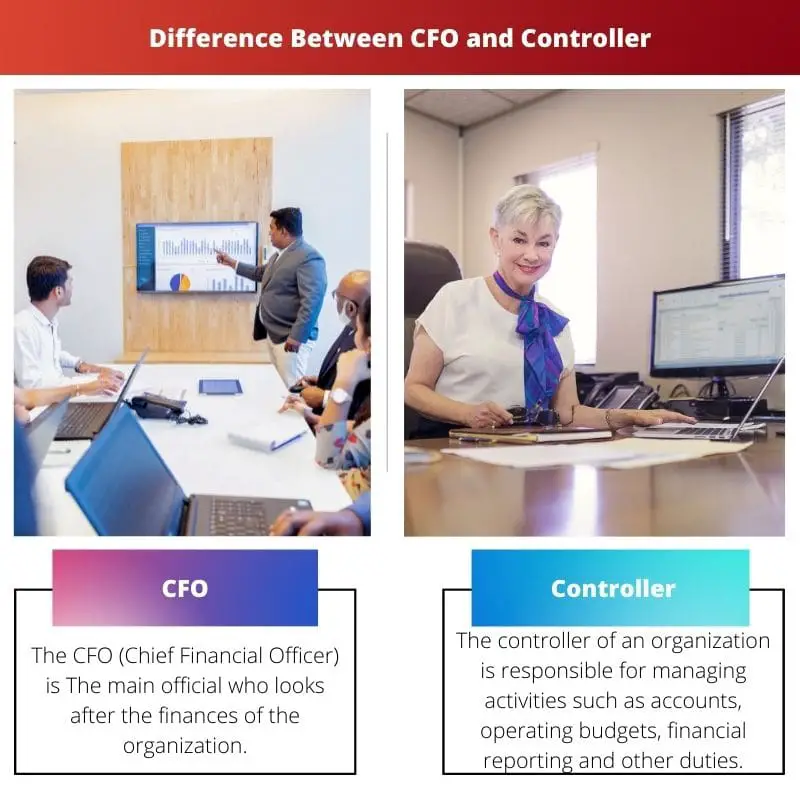The terms ‘CFO’ and ‘Controller’ comes under the field of the corporate sector in the business world. These two positions are very important parts of business organizations in which the economic and administrative functions are carried out, respectively.
They form part of the top management in a business organization. The CFO and Controller form part of the basic management structure and are interdependent in their functions.
Key Takeaways
- CFOs are responsible for managing a company’s finances and financial risks.
- Controllers are responsible for maintaining a company’s financial records and ensuring financial compliance.
- CFOs are part of the top executive team, while controllers are part of the accounting department.
CFO vs Controller
The difference between CFO (Chief Financial Officer) and the Controller is that the CFO of an organization is the main office of the organization, which looks after the finances and directs the organization. Whereas the controller of an organization looks after the accounts, bills, managing plans for the company, and controls.

The CFO (Chief Financial Officer) is the main office of the organization and looks after the finances of the organization. The CFO is responsible for reporting the analysis to the CEO (Chief Executive Officer) of the organization.
The CFO is the supervisor of the financial department and is associated with budgeting.CFO is in charge of budgeting the cash flow of the company. The CFO visions for the future betterment of an organization, whereas the controller associates with the day-to-day assessments.
The CFO assists the CEO in the growth of the organization, and the controller assists the CFO in maintaining the organization.
On the other hand, the controller of an organization is responsible for managing various activities such as accounts, operating budgets, financial reporting, and other essential duties of an organization.
The controller is responsible for reporting to the CFO (Chief Financial Officer), in short, the controller assists the CFO. The controller manages all the day-to-day work of an organization and is involved in every aspect of its functioning.
The CFO has more responsibilities and is more liable for business operations.
Comparison Table
| Parameters of Comparison | CFO | Controller |
|---|---|---|
| Definition | The CFO (Chief Financial Officer) is The main official who looks after the finances of the organization | The controller of an organization is responsible for managing various activities such as accounts, operating budgets, financial reporting, and other essential duties of an organization. |
| Budget | The CFO is associated with budgeting. | The controller is associated with the Operating Budget. |
| Management | The CFO is associated with the stakeholder | The controller is associated with the process of management of an organization. |
| Assistance | The CFO assists the CEO | The controller assists the CFO |
| Position | The CFO is in a higher position than the controller. | The controller is in a lower position as compared to the CFO. |
| Remuneration | Gets higher salary | Gets lower salary than a CFO |
What is a CFO?
The word CFO stands for Chief Financial Officer. The CFO of an organization is an advanced finance analyst.
The CFO looks after the financial planning, managing financial risks, financial reporting, and financial records. The CFOs are expected to be the main person to shape the organization from every corner and should be familiar with the technology.
The CFOs are also expected to be outspoken to guide the board members, as the CFO is also a part of the board and takes part in board meetings as has voting rights.
The CFO is associated with budgeting. The CFO looks after the organization’s spending plan.
The spending plan enables to advance of the budgets and decisions making of the organization. The CFO is the chief official of the financial department who plans the company’s finances and is responsible for reporting to the organization’s CEO (Chief Executive Officer).

What is a Controller?
The controller is the accountant of an organization who deals with high-level accounting. The controller looks after the accounts, bills, payroll, etc.
The controller works with the accounting team and supervises them, and further reports to the CFO. After the data analysis, the CFO further plans the budget and plans for future management.
The controller is associated with an operating budget. The controller deals with the expenditure, accounting, revenue, etc., of the organization.
The controller is associated with the process management of an organization. The controller measures, improve, optimize, and further reports to the CFO.

Main Differences Between CFO and Controller
- The CFO is the main head of finance, who looks after the finances of an organization. In contrast, the controller is the accountant of an organization, who looks after the accounts-related things of an organization.
- The CFO is associated with budgeting. In contrast, the controller is associated with an operating budget.
- The CFO is associated with the stakeholder management of an organization. In contrast, the controller is associated with the process management of an organization.
- The CFO assists the CEO (Chief Executive Officer). In contrast, the controller assists the CFO.
- The CFO possesses a higher position than the controller. In contrast, the controller possesses a lower position.
- The CFO controls the company from the top to bottom. In contrast, the controller manages from every direction.

- https://go.gale.com/ps/i.do?id=GALE%7CA144751761&sid=googleScholar&v=2.1&it=r&linkaccess=abs&issn=08954186&p=AONE&sw=w
- https://search.proquest.com/openview/4a888731b716dff84339009de95b78a3/1.pdf?pq-origsite=gscholar&cbl=41065

CFOs are the primary financial planners and strategists within an organization, responsible for shaping the company’s financial direction and future success.
The expertise of CFOs lies in financial planning and stakeholder management, while controllers are focused on the detailed management of an organization. Both roles are essential for an organization’s financial well-being.
I couldn’t agree more, Sally Bell. The distinct expertise of CFOs and controllers contributes to comprehensive financial oversight within a company.
CFOs are visionaries for an organization’s future development, while controllers handle day-to-day financial assessments. Their complementary functions are essential for business success.
I agree, Georgia29. The collaboration between CFOs and controllers ensures a balance between long-term strategic planning and daily financial operations.
The CFO’s role involves budgeting and financial planning, while controllers focus on managing operating budgets and financial reporting. Both are integral to a company’s success.
Absolutely, Ben Chapman. The combined efforts of these roles contribute to the effective management of an organization’s finances.
Well said, Ben Chapman. The collaboration between CFOs and controllers ensures the financial health and sustainability of an organization.
CFOs and Controllers are vital parts of business organizations because they handle the economic and administrative functions of a company.
That’s right, Tracy38. These positions require high-level strategic thinking and financial expertise.
CFOs are responsible for managing the company’s finances and financial risks, while controllers maintain financial records and ensure financial compliance. It’s essential to distinguish their specific responsibilities.
You’re absolutely right, King Chloe. Understanding the unique roles of CFOs and controllers helps establish effective financial management within an organization.
Agreed, King Chloe. The difference between CFOs and controllers is crucial for maintaining financial stability and compliance.
The CFO’s advocacy for financial planning and budgeting aligns with the organization’s growth, whereas controllers are focused on enhancing operational efficiency. Both roles are indispensable for a company’s financial well-being.
I agree, Isaac Cook. The synergy between CFOs and controllers drives strategic financial management and operational optimization in a company.
Precisely, Isaac Cook. A harmonious collaboration between CFOs and controllers is pivotal for maintaining financial health and driving growth within organizations.
The remuneration differences between CFOs and controllers reflect their distinct roles and responsibilities within an organization. Both positions play a critical part in driving the company’s financial success.
Well stated, Rebecca06. The varying remuneration levels underscore the different contributions of CFOs and controllers to an organization’s financial performance.
The CFO’s primary responsibility is to guide the growth of the organization, whereas controllers are focused on maintaining the organization through financial management. Both roles are necessary for a company’s prosperity.
Well articulated, Wright Toby. The synchronized efforts of CFOs and controllers contribute to the financial stability and advancement of organizations.
CFOs hold higher positions and have more responsibilities, while controllers are involved in managing day-to-day operations. Understanding their distinctions is crucial for efficient corporate governance.
Absolutely, Jrichards. Clarity on the roles and responsibilities of CFOs and controllers is fundamental for driving effective business outcomes.